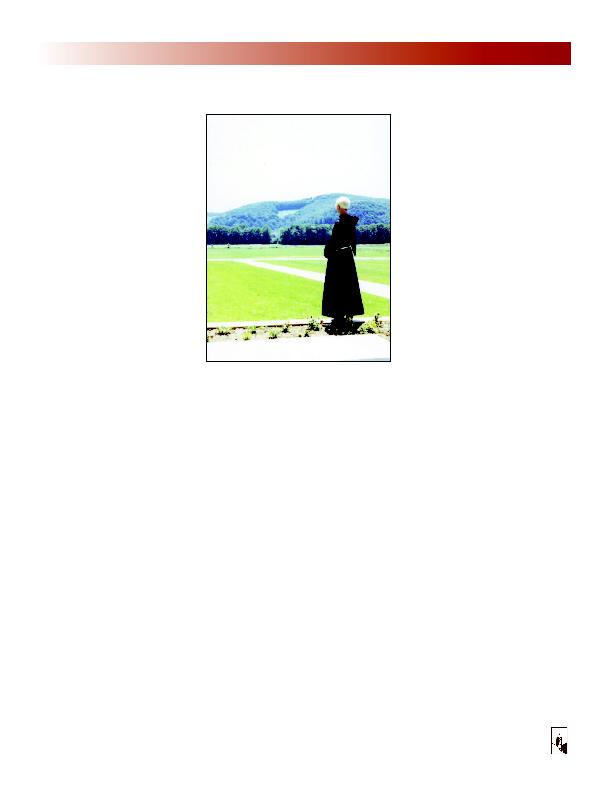
him unacceptable for religious life.
of an opening at a small Franciscan school in
Western New York called St. Bonaventure
College.
Olean, along with one of his best friends,
Robert Lax, who would himself go on to be-
come a renowned literary figure and talented
poet, and even visited the campus. He landed
an interview with Fr. Thomas Plassmann,
O.F.M., president of St. Bonaventure at the
time, and was hired to teach in the English de-
partment.
friends with several friars -- especially
Thomas Plassmann, Irenaeus Herscher and
Philotheous Boehner -- and continued to
discern where God was calling him.
tuality was shaped by the Franciscan
staff of St. Bonaventure Univer-
sity know exactly what I mean
somewhat heart-shaped pasture that
can be seen etched into the "en-
chanted" Allegheny Mountains across
the river and overlooking the SBU
campus.
only have glanced at it from afar, it
nevertheless remains a fixture in the
collective Bonaventure landscape of our
memories.
namesake or the significance of the
Franciscan tradition generally and the
St. Bonaventure campus specifically for
Thomas Merton.
membered as a best-selling author of
spiritual writing and, toward the end
of his life, a leading Catholic voice in
the civil rights, anti-war, and interreli-
gious-dialogue movements.
literature at Columbia University, con-
verted to Catholicism in 1938, and dis-
cerned a vocation to religious life. This
process of discernment and the recom-
mendation of his philosophy professor
and mentor Dan Walsh led Merton to
the Franciscan Order.
ciscan spirit." He applied to enter Holy
Name Province (the same province of
Franciscans that founded St. Bonaven-
ture) to become a Franciscan friar and
was initially accepted into the novitiate.
-- there would be no "Thomas Mer-
ton, O.F.M." He was told that he
should probably withdraw his applica-
tion after he expressed serious doubts
and confessed that he had withheld
certain details of his youthful past dur-
ing his interview with the friars at St.
N
2
2
venture, John Duns Scotus, William of Ock-
ham, and other Franciscan greats with
Boehner. He joined the Secular Franciscan
Order during his time at St. Bonaventure,
concretizing his "Franciscan spirit" in the
form of a professed way of living after the
example of St. Francis.
other way of membership among the
`tramps of God' -- in blue jeans, if not
patched brown cloth."
tured by the friars, tradition and spiritual-
ity that Merton encountered on the
campus of St. Bonaventure, and eventu-
ally blossomed into the full Franciscan
heart that continued to guide one of the
20th century's most-famous spiritual writ-
ers throughout his life.
about the enduring influence of his time at
St. Bonaventure, the significance of his friar
friends and mentors, and the spiritual
worldview of St. Francis that shaped his
"Franciscan side, which continues to
grow."
100th birthday on Jan. 31, 2015, we can
look to our older Bonaventure brother
Thomas Merton for guidance and inspira-
tion, knowing that we share much in
common. As we continue to think of the
meadow on the hill overlooking campus
as "Merton's Heart," we should also
pause to recall how the Bonaventure ex-
perience so many of us hold in each of
our hearts also indelibly shaped the real
heart of Thomas Merton.
can friar of Holy Name Province, a colum-
nist for America magazine, and the
author of several books including "The
Last Words of Jesus: A Meditation on
Love and Suffering" (2013) and the forth-
coming, "The Franciscan Heart of Thomas
Merton: A New Look at the Spiritual Influ-
ence of His Life, Thought, and Writing"
(2014).
O.F.M., looks out at the landscape that has be-
come known as Merton's Heart.